- Home
- Joseph Conrad
Heart of Darkness and the Congo Diary (Penguin Classics) Page 2
Heart of Darkness and the Congo Diary (Penguin Classics) Read online
Page 2
Mention the name of Joseph Conrad and the answering response will commonly invoke his celebrated African novella of 1899, Heart of Darkness. If the work has acquired an iconic status comparable to that of Edvard Munch’s painting The Scream (1893), its title has by contrast become something of a tired cliché in being so repeatedly used by newspaper headline-makers. Conrad, who modestly hoped that the work might have a continuing ‘vibration’, would have been astonished by these contemporary reverberations.
The story’s emergence as a twentieth-century ‘classic’ forms a first stage in the history of its remarkable after-life. A key moment arrived with T. S. Eliot’s use of a fragment from Heart of Darkness as an epigraph to his poem, ‘The Hollow Men’ (1925). Eliot’s epigraph signals a temporary kinship and establishes a bridge between the two works, but it also probably signifies a more intangible sense of indebtedness–to Conrad as an important founder-member of a tradition of British Modernist writing.
The story’s major rediscovery dates from the 1950s when its apocalyptic symbolism and existentialist uncertainty seem to have entered the collective consciousness of a generation who lived through the Second World War or were coming to terms with its legacy. As one critic of the time put it, the story had become ‘a Pilgrim’s Progress for our pessimistic and psychologizing age’ (Guerard, p. 33). Its more recent impact has been equally dramatic, if more controversial. Now standing at the centre of a wider contemporary debate about race, imperialism and feminism, its aesthetic dimensions and experimental character have almost been left behind. It has acquired the status of an awkward problem novel, a standard text in the classroom and–for better or worse–a litmus test for a variety of theoretical preoccupations. As a modern quest parable translated into many languages, it has simultaneously had a powerful generative effect upon twentieth-century writers and film-makers, inspiring emulations, adaptations and counter-versions.
I
Conrad’s direct and indirect engagement with things African has a long pre-history. It extends as far back as his childhood, when the young Pole pored over maps of the continent, devoured tales of the first European explorers in Africa and vicariously shared the perils of Dr Livingstone’s travels. Like all dreams of heroic adventure, this one was destined to meet with a rude awakening. In 1890, towards the end of his career as a merchant seaman, the thirty-three-year-old Conrad signed a long-term contract to work for a Belgian company in the Congo Free State. The country he entered had since 1885 been the personal possession of King Leopold II of Belgium, who, under the guise of a philanthropic concern to bring ‘light’ to the ‘dark’ continent, was brutally engaged in what Conrad later described as ‘the vilest scramble for loot that ever disfigured the history of human conscience and geographical exploration’.1
Conrad’s growing desire to return to Europe was unexpectedly realized when he suffered a physical breakdown: plagued with the after-effects of dysentery and malaria, he ended his stay after seven months, returned to a period of hospitalization in London and suffered a legacy of ill health for the rest of his life. His first-hand encounter with the effects of Leopold’s rule in the Congo almost certainly left him with deeper scars: according to a close friend, the episode formed ‘the turning-point in his mental life’, shaped ‘his transformation from a sailor to a writer’ and ‘swept away the generous illusions of his youth’.2
One of the products of this period was ‘The Congo Diary’ (included in this edition), Conrad’s record of his daily movements during the first part of his stay. Severely factual and never intended for publication, the diary nevertheless offers his earliest written account of a peopled Africa and may have been kept to preserve material that would be of use to the later writer.
Conrad’s first African work, ‘An Outpost of Progress’, was composed six years later. A fine short story in its own right, ‘An Outpost’ also represents an important stage in Conrad’s attempt to fashion a serious and grown-up colonial fiction distinct from the boyish adventure stories of G. A. Henty and Rider Haggard. From his early Eastern novels the story inherits the large spectacle of the European abroad, removed from the constraints of the Western ‘crowd’, isolated in the wilderness and undergoing swift collapse. Here, however, the predicament is shaped by an acutely political awareness, with the focus partly upon its two carefully chosen types (a bureaucrat and a soldier) and partly upon the representative imperialist fictions arriving from Europe with them.
The degeneration of the two supposed ‘light-bringers’ is remorseless: they arrive in Africa voicing the conventional view that as racially superior Europeans they have the right and duty to civilize ‘backward’ peoples, but ironies emerge when it transpires that, as two of Europe’s failed rejects, they are happy to cultivate failure, content with their fellowship in idleness and oblivious to the civilized litter they leave around an increasingly inefficient trading-post. Ultimately, however, the strengths of the story as a polemic–its aloof omniscient narration, singleness of focus and sparkling sarcasm–also serve to define its limits. In Conrad’s later view, ‘An Outpost’ was mainly an important stepping-stone towards Heart of Darkness, in which an English narrator, Marlow, agitatedly reflects upon an earlier visit to Africa and his quest there towards the charismatic European trader, Kurtz. According to Conrad, his return to an African subject coincided with a widening sense of its possibilities and was accompanied by an intense ‘nightmare feeling’ (Collected Letters, vol. II, p. 162).
II
Enigmatic though Heart of Darkness may finally prove to be, its early episodes are remarkable for their trenchant topicality. At the outset of its composition, Conrad described the story as being of ‘our time distinc[t]ly’ in its concern with the ‘criminality of inefficiency and pure selfishness when tackling the civilizing work in Africa’ (Collected Letters, vol. II, pp. 140–41). For his subject, he again returned to what was bluntly described in a coinage of 1884 as the ‘Scramble for Africa’, one resulting in the systematic annexation and exploitation of Africa by European powers during the last decades of the nineteenth century.
At an early point, the story offers a summary of these developments. The map of Central Africa available to the youthful Marlow presents it as a white blankness, an unexplored and unnamed terra incognita. To the older Marlow, the area has become, presumably as a result of European expansion, a more impenetrable and menacing ‘place of darkness’ (9), while yet another map of the continent presents him with a multi-coloured chart, its pattern the visible evidence of European territorial possessions. Even more topically, the story’s opening sequences confronted its first readers with echoes of their most recent newspaper headlines–in references to the building of a railway or to expanding trade-syndicates or to increasing militarization in Africa, as signalled by the presence of mercenary soldiers and a blockading French gunboat.
This sense of topical issue is, however, most marked in Marlow’s acerbic quarrel with manifestations of the period’s sophisticated propaganda machinery, of which the popular press formed a crucial cog. Heart of Darkness was written against a background of recent imperial celebration of a feverishly utopian kind. Queen Victoria’s diamond jubilee in 1897 occasioned an exaltation of the British Empire and the importance of the imperial idea to the country’s future as an international power. In her diary for that year, Beatrice Webb summarized the social mood: ‘Imperialism in the air!–all classes drunk with sight seeing and hysterical loyalty’.3 Articles in the New Review evoke the wider note of intoxicated eulogy in lauding the Queen as ‘the Great White Mother, the fame of whose virtue has won the loyalty of native races as the genius of Alexander or a Napoleon never could’ and characterizing the British imperial idea as an onerous religious destiny: ‘Since the wise men saw the star in the East, Christianity has found no nobler expression’.4 A stream of propaganda also emanated from Brussels, where, as Conrad later observed, Leopold had commandeered press opinion–by, in effect, colonizing its language–in order to engineer an outrag
eous ‘newspaper “stunt’”.5
The story’s early progress from Europe to Africa offers a virtual initiation into the contagious power of the period’s official imperial propaganda–in the anonymous narrator’s eulogy to the River Thames, in the colourful hyperbole picked up by Marlow’s aunt from her newspapers and through a variety of European voices in Africa. Sharing his creator’s sense of the power of the printed word, Marlow is acutely aware of its journalistic misuse in rendering people essentially blinkered and insentient. Its invasive power is further suggested by the fact that for most of these speakers such rhetoric is a reflexive act: they are not, on the whole, individuals seeking to use hyperbole to disguise an unsavoury truth, but inert victims and instruments of linguistic coercion.
Marlow’s counter-response takes a number of forms: sometimes he simply speaks plainly of newspaper ‘rot’, often he notes the spurious authority given to bureaucratic functionaries in Africa by their naming (as in the case of the euphemistically styled ‘Workers’ or ‘agents’), while elsewhere he is shocked by the outrageous incongruities thrown up by the unthinking use of cliché. For example, his grim mirth at hearing from The Harlequin that the heads on stakes belong to ‘rebels’ prompts the comment: ‘Rebels! What would be the next definition I was to hear? There had been enemies, criminals, workers—and these were rebels. Those rebellious heads looked very subdued to me on their sticks’ (73).
If much of the best imaginative literature thrives on the exposure of what George Orwell termed Newspeak, it also abhors a vacuum. Silences usually prevailed in the popular press of the 1890s about the exact nature of European rule in Africa and its effect upon her indigenous peoples and customs. By 1897, however, damning facts about the Congo were beginning to filter into British newspapers, as in The Times of 13 May, which reported an ex-Congo missionary’s testimony that ‘gross atrocities were perpetrated by the soldiers of the State on the natives, amounting in some cases to shooting and in others to mutilation, for refusal to labour in the gathering of india-rubber. Whole villages were spoliated and destroyed’.6 The first part of Conrad’s story belongs to this early move towards silence-breaking: ‘I have a voice…and for good or evil mine is the speech that cannot be silenced’ (44).
Marlow’s initiation into Africa allots him a role not unlike that of an on-the-spot foreign correspondent, with his own independent sense of what is newsworthy: he watches, listens, reports on his interviews and trusts in the power of hard, definite particulars. The picture of Africa to emerge combines the image of a messily organized scramble for ‘loot’ with that of a chaotic war zone littered with upturned rusting trucks, abandoned drainage pipes and gaping craters. He also allows space for voices unheard in the newspapers of the time–those of the European ‘agents’, traders and other hangers-on. These voices range from the brickmaker and his version of justice–‘Transgression—punishment—bang! Pitiless, pitiless. That’s the only way’ (31)–to Marlow’s companion and his reasons for being in Africa–‘To make money, of course. What do you think?’ (24)–and include a description of the agents’ collective voice: ‘The word “ivory” rang in the air, was whispered, was sighed. You would think they were praying to it. A taint of imbecile rapacity blew through it all, like a whiff from some corpse’ (27).
The sense given of a narrator wishing to recover an Africa lost, ignored or silenced culminates in the description of the ‘grove of death’:
[The African workers] were dying slowly—it was very clear. They were not enemies, they were not criminals, they were nothing earthly now—nothing but black shadows of disease and starvation, lying confusedly in the greenish gloom. Brought from all the recesses of the coast in all the legality of time contracts, lost in uncongenial surroundings, fed on unfamiliar food, they sickened, became inefficient, and were then allowed to crawl away and rest…Near the same tree two more, bundles of acute angles, sat with their legs drawn up. One, with his chin propped on his knees, stared at nothing, in an intolerable and appalling manner: his brother phantom rested its forehead, as if overcome with a great weariness; and all about others were scattered in every pose of contorted collapse, as in some picture of a massacre or a pestilence. (20)
Like a poem by Wilfred Owen from the First World War battlefront, this heightened reportage quickly dispenses with the rattle of official verbiage in order to recover unreported facts–in this case, of wasted African lives. The sense of waste is intensified by the wider context. Marlow has just passed through a rubbish tip for discarded pipes and rusty machinery, and the implication is that the worn-out Africans have been similarly discarded: having served their function, they are thrown away like disposable objects. Crass labels discarded, Marlow assimilates the details of human waste into an extended elegy, with an invitation to complete it by recalling a picture of Bosch-like extremity.
In conjunction with other contemporary events, Heart of Darkness played no small part in effecting a linguistic change that, in turn, reflected a wider shift in attitudes. In 1897, the words ‘Imperial’ and ‘Imperialism’ (both normally capitalized) carried hardly any pejorative meanings and, with their Latin equivalents (Imperium et Libertas), formed a natural part of the period’s rhetoric. But by 1903, in the aftermath of the Boer War and when the scandal of the Congo caused E. D. Morel to found the Congo Reform Association, the terms began to acquire less reputable associations and could no longer be used as a form of unthinking national self-congratulation.
III
During its composition, Heart of Darkness developed like ‘genii from the bottle’ in ways that seem to have surprised Conrad himself, prompting him later to feel that its last two instalments were ‘wrapped up in secondary notions’ (Collected Letters, vol. II, pp. 146, 157). One sign of its changing character is that Marlow, predominantly a detached figure in Part I, becomes with his journey upriver an involved participant, increasingly excited, feverish and panic-stricken. Simultaneously, he is obsessed by the charismatic voice of Kurtz, a spectral figure who actively dominates the later part of the story. With these developments, the pattern of the quest becomes more insistent. Marlow conceives of his journey as culminating in a meeting with Kurtz, who is himself engaged in a quest into unexplored regions: when the two make contact late in the story, they become, in effect, agents in each other’s lives.
Successive generations of critics have been impelled to testify to the nature of the elusive developments following upon Marlow’s upriver departure, and there is now virtually an interpretation of the story to suit every predilection–the psychoanalytic, philosophic, political, post-colonial and gender-based. Each generation has also thrown up a major dissenting critic. In the immediate post-1950 period, F. R. Leavis was highly influential with his claim that the story was marred by an ‘adjectival insistence upon…inexpressible and incomprehensible mystery’.7 Later generations have been overshadowed by the Nigerian novelist and critic Chinua Achebe, whose angry polemic of 1975 accused Conrad of virtually betraying his subject by eliminating ‘the African as a human factor’, lamented his ‘preposterous and perverse arrogance in reducing Africa to the role of props for the break-up of one petty European mind’ and condemned the author as a ‘bloody racist’.8
Traditionally, the most immediate problem for readers has been that of adjusting to the tale’s dramatically changing character. Although Part I anticipates some of the terms of Marlow’s coming quest, it hardly foreshadows the ambitious symbolic method to be brought into play. In part, Marlow himself becomes an active symbol-maker, constantly seeking a figurative equivalent for his feelings. But in addition, the obscure nightmare in which he is embroiled increasingly determines the character of the story and embraces Kurtz as a significant part of its structure: everywhere felt but only occasionally glimpsed, the latter emerges as a strangely protean presence, forming and re-forming like the genie from a bottle. Achebe regards the story as involving a single ‘petty European’, but the symbol of dark nightmare also has a strenuously generalizing effect i
n suggesting that all Europeans are involved in the breakdown of the imperial dream.
Symbolic method also brings with it a new, and in some ways, problematic range of ‘secondary’ interests. In moving away from the symptoms of colonial rowdyism in Part I, the tale is not thereby always less topical, but it now devises markedly wider tests in order to probe the credentials of the European mission in Africa. As a compendium of decadent excesses, the figure of Kurtz is obviously central to the tale’s free-wheeling and–as some readers have felt–erratically widening scope. His is the most comprehensive test and the most spectacular fall; in one of his many guises, he offers access to what might be called Europe’s political unconscious–into the underlying obsessions and needs that both fostered and found relief in the imperial project. And finally, when Marlow returns to Europe, he brings with him a Kurtzian legacy that helps to shape an even wider vision of Western civilization and its discontents.
Early in Part II, with the beginning of Marlow’s journey to the interior, the tale signals that the narrator’s own inherited British traditions will be the first to come under scrutiny. The terms of this ordeal would have been familiar to late-Victorian readers, since what is on trial is a principle at the very basis of their culture and underpinning its ‘mission’ in the colonies–the work ethic as an agency of order and progress. In Britain, the gospel of work was associated with the Victorian sage Thomas Carlyle, in whose writings the principle gathered numerous moral, religious and philosophic resonances. As a British merchant seaman, Marlow’s tradition is a seamanly in-flexion of the Carlylean gospel. Marlow spells out the tonalities of this humanistic ideal: ‘I don’t like work—no man does—but I like what is in the work—the chance to find yourself. Your own reality—for yourself, not for others’ (35). For him, the notion brings with it a view of the seaman’s life as involving the pursuit of an honourable vocation, the performance of a social obligation in the cause of human solidarity and the restraining of individuality by the collective ethic. Translated into the context of colonial ‘work’, the ethic also involves a tough, no-nonsense pragmatism–the ability, as Marlow puts it, to bury dead hippo without being too bothered by the smell.

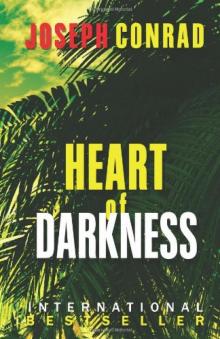 Heart of Darkness
Heart of Darkness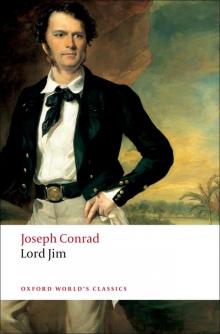 Lord Jim
Lord Jim The Nigger of the Narcissus (Echo Library)
The Nigger of the Narcissus (Echo Library)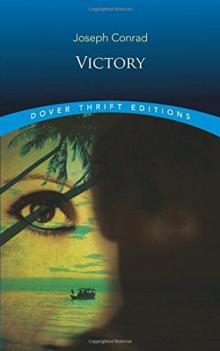 Victory (Dover Thrift Editions)
Victory (Dover Thrift Editions) Secret Agent
Secret Agent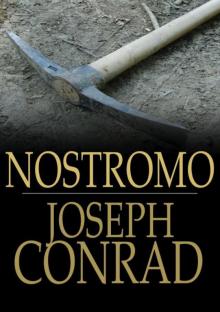 Nostromo
Nostromo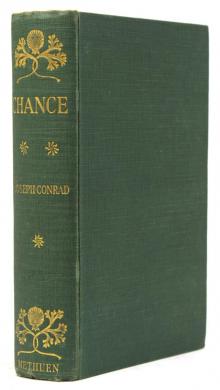 Chance: A Tale in Two Parts
Chance: A Tale in Two Parts Youth
Youth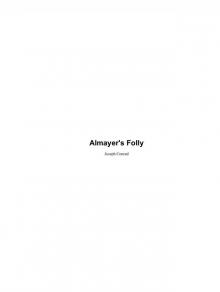 Almayer's Folly
Almayer's Folly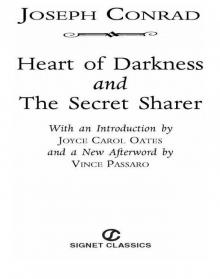 The Heart of Darkness and the Secret Sharer
The Heart of Darkness and the Secret Sharer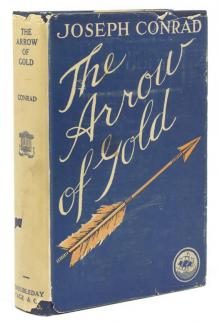 The Arrow of Gold: A Story Between Two Notes
The Arrow of Gold: A Story Between Two Notes The Rescue: A Romance of the Shallows
The Rescue: A Romance of the Shallows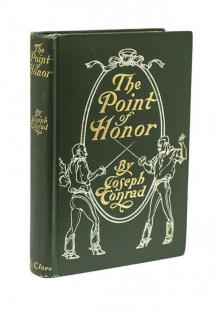 The Point Of Honor: A Military Tale
The Point Of Honor: A Military Tale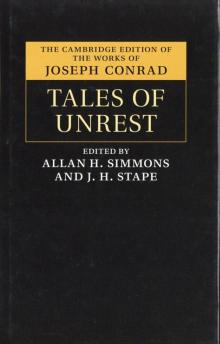 Tales of Unrest
Tales of Unrest Under Western Eyes
Under Western Eyes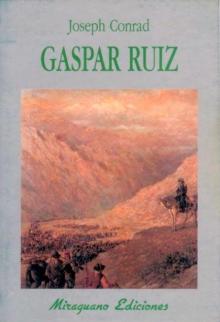 Gaspar Ruiz
Gaspar Ruiz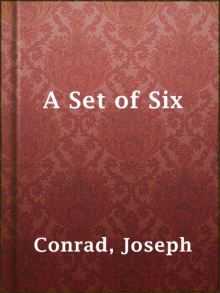 A Set of Six
A Set of Six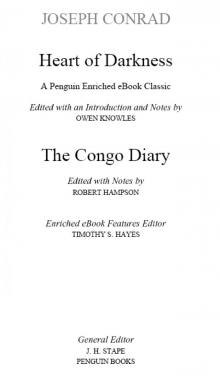 Heart of Darkness and the Congo Diary (Penguin Classics)
Heart of Darkness and the Congo Diary (Penguin Classics)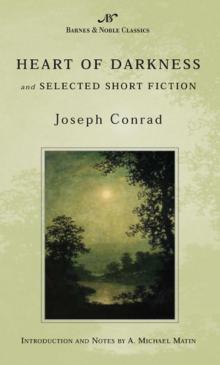 Heart of Darkness and Selected Short Fiction
Heart of Darkness and Selected Short Fiction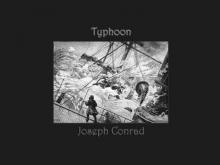 Typhoon
Typhoon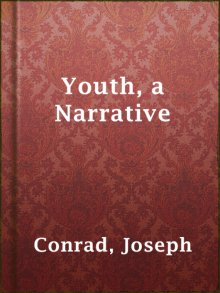 Youth, a Narrative
Youth, a Narrative Tomorrow
Tomorrow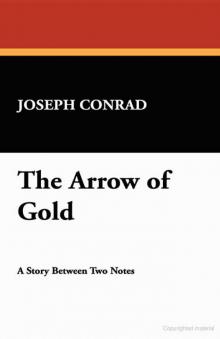 The Arrow of Gold
The Arrow of Gold The Shadow Line: A Confession
The Shadow Line: A Confession The Rescue
The Rescue Victory (Echo Library)
Victory (Echo Library) The Brute
The Brute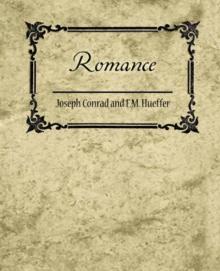 Romance
Romance A Personal Record
A Personal Record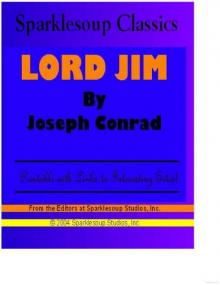 Lord Jim: A Tale
Lord Jim: A Tale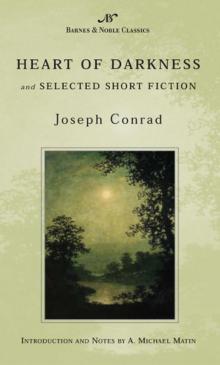 Heart of Darkness and Selected Short Fiction (Barnes & Noble Classics Series)
Heart of Darkness and Selected Short Fiction (Barnes & Noble Classics Series) Within the Tides
Within the Tides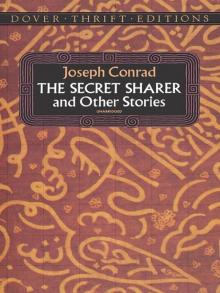 The Secret Sharer and Other Stories
The Secret Sharer and Other Stories Falk
Falk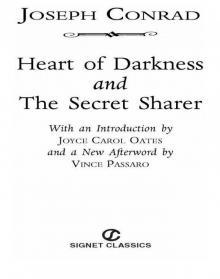 Heart of Darkness and The Secret Sharer
Heart of Darkness and The Secret Sharer Chance
Chance An Anarchist
An Anarchist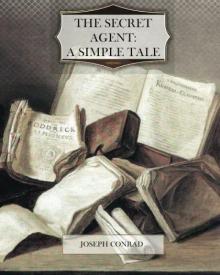 The Secret Agent: A Simple Tale
The Secret Agent: A Simple Tale The Secret Agent
The Secret Agent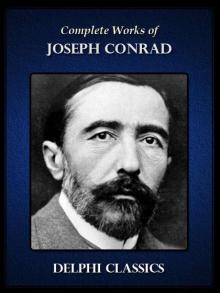 Complete Works of Joseph Conrad (Illustrated)
Complete Works of Joseph Conrad (Illustrated)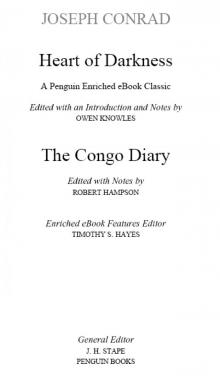 Heart of Darkness and the Congo Diary
Heart of Darkness and the Congo Diary Notes on Life & Letters
Notes on Life & Letters Typhoon (Single Story)
Typhoon (Single Story)